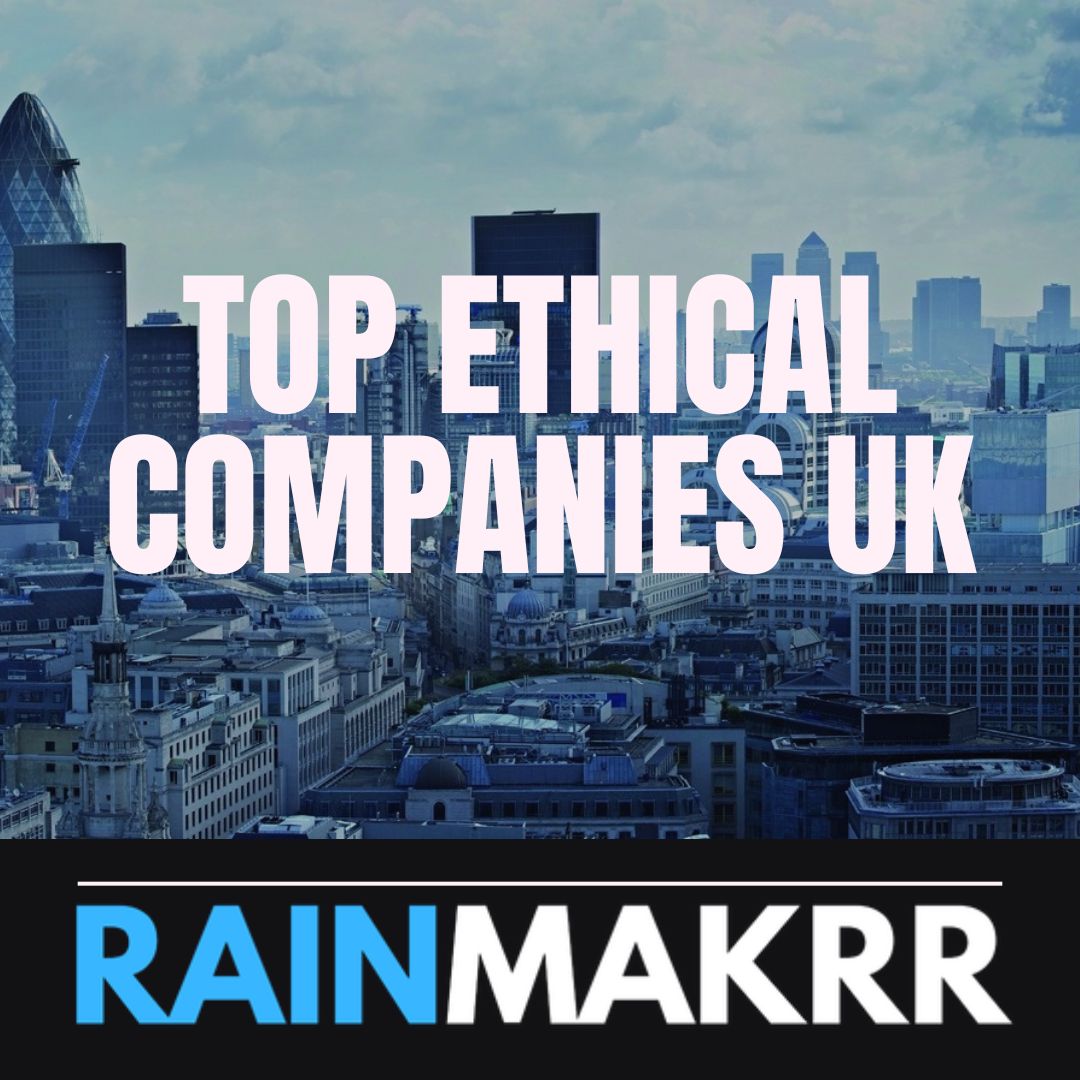
Top Ethical Companies UK & Ethical Startups London: Leaders in Corporate Responsibility
The landscape of corporate ethics in the UK is undergoing a transformation as consumers increasingly demand transparency and responsibility from the businesses they support.
Ethical companies in the UK are setting benchmarks by integrating sustainable practices into their operations, prioritising not just profitability but also the well-being of people and the planet.
These entities exemplify that commercial success can align with, and indeed benefit from, ethical business practices.
Top Ethical Companies UK & Ethical Startups London Guide
Sustainable companies are those that acknowledge the finite nature of resources and strive for a reduced environmental footprint.
They adopt practices such as using natural fibres, managing waste responsibly, and sourcing materials sustainably, proving that ethical considerations can coexist with high standards of quality and performance.
In recognising these efforts, a number of UK enterprises are being highlighted for their commitments to ethical principles.
From fashion brands committed to circular production models to investment firms evaluating the ethical implications of their portfolios, these organisations are emerging as leaders in a movement towards more conscious capitalism.
They offer compelling evidence that ethical business practices not only foster a better world but can also be a catalyst for innovation and growth.
Understanding Ethical Business in the UK
Ethical business practices in the UK encompass a myriad of considerations, from transparency in decision-making to the conscientious application of ethical criteria.
This section delves into the essence of what constitutes an ethical business and the standards against which such companies are measured.
Defining Ethical Business
Ethical business refers to the manner in which a company integrates moral principles into its operations and strategies.
It involves a commitment beyond mere compliance with laws and regulations, focussing on positive actions towards employees, the environment, and society at large.
At its core, an ethical business seeks to do no harm and to contribute to the well-being of all stakeholders.
Criteria for Ethical Companies
The criteria for ethical companies serve as guidelines for both assessment and aspiration. It includes:
- Transparency: Clear, honest, and open communication with stakeholders, encompassing everything from sourcing materials to pricing.
- Decision-making: Consideration of ethical implications in corporate choices, ensuring decisions are aligned with moral ideals and the long-term interests of various stakeholders, not just shareholders.
These criteria act as a foundation upon which ethical businesses build their reputation and operational frameworks.
The Impact of Ethical Companies on the Environment
Ethical companies in the UK significantly influence environmental sustainability and carbon management.
They lead the way in reducing carbon emissions and champion the use of clean energy sources.
Carbon Footprint and Emissions
The commitment to minimising the carbon footprint has become a core component of ethical business strategies.
Companies actively measure and report their greenhouse gas emissions, seeking innovative solutions to lower their impact.
For example, the pharmaceutical giant GlaxoSmithKline has received recognition for its efforts in leading on social practices, which include robust measures to reduce its carbon output.
Such companies often invest in projects that contribute to a decrease in greenhouse gases, moving the UK closer to its emission targets.
Sustainability and Clean Energy
Sustainability efforts extend beyond just controlling emissions.
The rise of clean energy adoption is a vital aspect of the sustainable agenda. Ethical companies invest in renewable energy sources, such as wind and solar power, to replace fossil fuels.
Aerial Power, based in London, epitomises this shift by developing a drone-based system to efficiently clean solar panels, thus promoting solar energy use with reduced environmental impact.
These steps by enterprises not only reflect their corporate responsibility but also encourage a broader cultural change towards environmental consciousness.
Investment and Ethical Financing
In the landscape of UK finance, ethical investment strategies and the role of institutional investors have become critical elements.
These practices ensure that invested capital aligns with the values of positive social and environmental impact.
Ethical Investment Strategies
Ethical investment strategies involve selecting investments based on moral principles and social responsibility. This conscientious approach typically excludes companies that fail to meet certain ethical standards.
Triodos Bank stands out in this realm, offering investment opportunities that focus on positive environmental, social, and governance (ESG) outcomes. Investors may consider funds that support renewable energy initiatives or companies with strong human rights records.
Carefully curated ethical funds function as a bridge for investors, connecting their money with initiatives that contribute to sustainable development without compromising on potential financial returns.
Role of Institutional Investors
Institutional investors, such as pension funds and insurance companies, wield substantial financial clout in the market. Their decisions to channel capital into ethical investments can exert significant influence over corporate behaviours.
By prioritising investments in ethical funds and sustainable enterprises, institutional investors demonstrate that responsible investing can also be financially prudent.
Marks & Spencer Group PLC, known for its commitment to sustainability, attracts ethical capital, signalling the market’s support for companies that incorporate ESG principles into their business models.
Institutional investors, therefore, play a pivotal role in scaling up ethical investment practices and setting new standards across industries.
Top Ethical Companies UK & Ethical Startups London
Consumer Influence on Ethical Business
Consumer engagement plays a pivotal role in shaping ethical business practices in the UK, as citizens increasingly hold companies accountable for their actions.
The demands for transparency and the use of purchasing power have pushed corporations to reconsider their impact on society and the environment.
Demand for Transparency
Consumers are demanding greater transparency from companies, affecting how businesses operate and market themselves.
Initiatives such as the UK Ethical Markets Report illustrate the growth of ethical markets, significantly influenced by consumer desires for openness about supply chains, labour practices, and environmental footprints.
This push for clarity has shown that when consumers are bestowed with the truth, their trust grows, and they are more likely to establish loyalty with those brands that align with their values.
Purchasing Power and Impact
The purchasing power of individuals has turned into a persuasive driver for ethical conduct within enterprises.
As noted in discussions about ethical investment possibilities, consumers are conveying their standards through spending, which pressures businesses to adopt ethical practices not only to maintain profit but morality in the eyes of their customer base.
Evidence of this is seen in the various sectors, such as eco-travel and the surge in alternatively fuelled vehicles, highlighted by the increases in ethical spending.
Subsequently, this consumer-driven demand for responsible business behaviour reinforces the positive impact of ethical purchasing on the community at large.
Ethically Produced Goods and Services
The demand for ethically produced goods and services has amplified across various industries in the UK, with consumers increasingly seeking transparency and sustainability.
Companies are responding by integrating ethical practices across their operations, from sourcing to sales.
Fashion and Apparel
Ethical fashion in the UK has moved beyond niche market appeal to mainstream prominence.
Companies, such as those featured in the Ethical Consumer Markets Report, have started to use organic cotton extensively, prioritising the welfare of both the environment and the workers involved in the production process.
Notable brands have made commitments to responsible sourcing, reducing waste and improving labour conditions, setting a benchmark for ethical fashion.
Food and Beverage
In the food sector, there has been substantial growth in the availability of ethical food products, including items like tea, which is sourced following Fairtrade standards to ensure farmers receive fair compensation.
Many companies are now branded as ethical for their sustainable farming practices and reduced environmental footprints, highlighting the importance of stewardship in food production.
Transparency in food sourcing has become an essential factor for consumers making purchasing decisions.
Health and Beauty Products
The health and beauty sector has also seen a surge in ethical company credentials, with firms focusing on cruelty-free, organic, and vegan products.
These businesses commit to omitting harmful chemicals and embrace practices that do not harm animals.
Consumers can access a range of ethical products, confident in the knowledge that their purchases support environmental and animal welfare.
Innovations in Ethical Company Practices
The landscape for ethical companies in the UK is evolving rapidly, with innovations that are setting new benchmarks in sustainability and corporate responsibility.
This section delves into the advancements that characterise today’s leading ethical companies, highlighting how they’re reshaping business practices for a more sustainable future.
Sustainable Technologies
Ethical companies in the UK are embracing sustainable technologies to reduce their carbon footprint and enhance efficiency.
For instance, the widespread use of renewable energy sources such as wind power has become more prevalent, with companies like Greencoat UK Wind PLC leading the charge in this transformation.
The incorporation of energy-efficient systems across operations demonstrates the dedication of such businesses to a circular economy, where resource input and waste, emissions, and energy leakage are minimised through closed-loop systems and recycling processes.
Green Product Design
In the realm of green product design, there is a growing trend of UK companies focusing on sustainable materials and products that are both eco-friendly and recyclable.
These products are designed from the outset with the end of their lifecycle in mind, to ensure a minimal environmental impact.
Marks & Spencer Group PLC (often referred to simply as Marks & Spencer or M&S) is a notable example, having incorporated sustainable products into their ranges, such as clothing made from ethical cotton and initiatives that encourage garment recycling, demonstrating the company’s commitment to reducing waste and promoting sustainable materials.
Top Ethical Companies UK & Ethical Startups London Guide
Corporate Responsibility and Community Engagement
In the UK, numerous companies are placing a strong emphasis on corporate responsibility, with a focus on community engagement and employee welfare as cornerstones for sustainable business growth.
Community Support Initiatives
In recent years, British businesses have stepped up their community engagement efforts with a variety of support initiatives.
They are providing financial contributions to local charities, and sponsoring community events, which are vital for fostering social impact.
Notably, the Bank of England sets an example by valuing its community and protecting the environment, reflecting their commitment to corporate responsibility.
- Examples of Community Support Initiatives:
- Donation drives for local non-profits
- Sponsorship of local sports teams or cultural events
Employee Welfare
The welfare of employees is integral to companies’ corporate social responsibility (CSR) strategies. Ensuring fair work practices, promoting diversity, and encouraging work-life balance are key elements that contribute to a positive workplace culture.
Trends in employee welfare also include support for mental health and professional development, aligning with a comprehensive approach to CSR.
- Key Aspects of Employee Welfare:
- Mental health support programmes
- Professional development and training opportunities
By prioritising these areas, companies are able to generate a significant social impact, improving the lives of community members and enhancing the wellbeing of their employees.
Assessing Company Performance and Ethics
To evaluate the ethics of UK companies, one must consider both their performance metrics and adherence to ethical principles.
This involves analyzing rankings that reflect their practices and commitments, as well as corporate reporting that provides assurance about their operations.
Ethical Rankings and Certifications
Ethical rankings, such as those published by independent review sites, play a crucial role in assessing companies.
B-Corp Certification is a prestigious designation that indicates a company’s commitment to social and environmental performance, accountability, and transparency.
A business holding B-Corp status, like a major credit card company, Mastercard, often undergoes rigorous assessments to verify its positive impact not only financially but on society and the environment.
Corporate Reporting and Assurance
Transparent corporate reporting, including annual reports and external audits, offers assurance about a company’s ethical practices and financial health.
Assurance services go beyond mere compliance checks; they delve into how deeply a company’s ethical values are embedded in its culture and operations.
Companies often rely on external auditors to validate their ethical standards, such as those provided by Intertek Group PLC, which specialises in systemic assurance of corporate ethics.
Challenges in Maintaining Ethical Practices
Maintaining ethical practices presents numerous challenges for top UK companies. These difficulties often stem from regulatory complexity and the need to align profit-driven goals with ethical values.
Regulatory Hurdles
Companies in the UK operate within a dense web of regulations that aim to ensure ethical practices. However, the constantly evolving nature of these regulatory frameworks can be challenging for companies to navigate.
According to a report by the Financial Times, almost half of FTSE 350 groups do not have publicly available ethical frameworks.
The gap between regulations and actual business practice highlights the struggle companies face in maintaining compliance and ethical standards.
- Complexity of Regulations: Firms must juggle various international, national, and industry-specific guidelines.
- Enforcement: There is a significant pressure to stay updated with the latest regulatory changes to avoid penalties and reputational damage.
Balancing Profit and Purpose
The pursuit of profit and the commitment to a purpose-led ethos can sometimes be at odds. Ethical business models insist on integrating core values into every aspect of operations, which can impact short-term financial performance.
For instance, CIPD’s guide on ethical practice underscores the importance of creating a shared ethical culture, where the impact of decisions on stakeholders is considered alongside profitability.
- Profit Expectations: Shareholders and investors often prioritise short-term financial returns.
- Ethical Commitments: Upholding ethics can require significant investment in employee training, responsible sourcing, and transparency initiatives.
The commitment to staying ethical in business demands not only structural adjustments but also a philosophical shift in assessing company success and value.
Notable Ethical Companies in the UK
In the landscape of UK businesses, a variety of companies stand out for their ethical practices. PensionBee Group PLC, recognised for its consumer-focused financial services, and GlaxoSmithKline PLC, noted for its commitment to ethical pharmaceutical development, are prominent entities listed in guides as ethical investment options.
Additionally, the retail giant Marks & Spencer Group PLC is often cited for its sustainability efforts and ethical sourcing.
- PensionBee Group PLC: Pensions made simple with a clear ethical standpoint.
- GlaxoSmithKline PLC: Innovating in healthcare, ethically and globally.
- Marks & Spencer Group PLC: Integrating sustainability in retail practices.
The outdoor apparel company Patagonia is well-regarded internationally and within the UK for its environmental activism and corporate responsibility.
Its business model places sustainability at the core of its mission, resonating with eco-conscious consumers. Moreover, Triodos Bank is a leading example of an ethical financial institution, investing exclusively in projects with positive social and environmental impacts.
- Patagonia: Championing environmental causes through sustainable apparel.
- Triodos Bank: Banking with a conscience, where money works for positive change.
Ecover, on the other hand, sets a benchmark in the manufacturing of eco-friendly cleaning products, connecting with consumers prioritising ecological impacts.
Furthermore, organisations endorsed as B Corp reflect the highest standards of verified social and environmental performance, legally required to consider the impact of their decisions on their workers, customers, suppliers, community, and the environment.
- Ecover: Clean homes, clear conscience with plant-based ingredients.
- B Corps: Corporation certification representing a transparent commitment to ethics.
These companies demonstrate that ethical business practices are not only possible but also beneficial for building strong, sustainable, and trusted brands.
Top Ethical Companies UK & Ethical Startups London
Future Trends in Ethical Business
The ethical landscape of business is pivoting towards a heightened integration of moral principles within corporate strategies.
This evolution, underpinned by consumer expectations and regulatory pressures, is expected to advance alongside emerging markets and technology.
Emerging Markets and Ethics
As emerging markets continue to grow, companies operating within these regions are increasingly adopting ethical practices. They recognise that a commitment to ethical behaviour not only caters to consumer demand but also establishes a sustainable business model.
For instance, in industries where climate change is a critical concern, there is a noticeable shift towards environmentally sustainable practices.
They are prioritising renewable energy sources and reducing greenhouse emissions, aligning their operations with global efforts to mitigate climate impact.
Technological Advancements
Technological developments are driving changes in the way companies approach ethics. Blockchain technology, for example, offers transparency in supply chains, ensuring that ethical standards are maintained from production to sale.
Meanwhile, artificial intelligence (AI) can help in monitoring compliance and detecting potential ethical breaches, thereby reinforcing integrity within businesses.
Companies are also increasingly accountable for their data management policies, safeguarding consumer privacy and maintaining trust through robust cybersecurity measures.
The rise of ‘tech ethics’ has become a strand in itself, with companies striving to address the societal implications of technology.
Ethical Fashion Brands Leading the Way
The ethical fashion movement has gained significant momentum in recent years, with a growing number of brands placing greater emphasis on sustainability, fair labour practices, and reduced environmental impact.
This shift addresses some key concerns within the fashion industry, such as the negative effects of fast fashion and the exploitation of workers.
For those looking to make a positive impact with their clothing choices, several UK-based brands showcase ethical and sustainable practices. Among the top-ranking fashion retailers are companies that focus on vegan materials, organic cotton, and sustainable production methods.
Leading the way in using environmentally-friendly materials is Organic Cotton, offering ethically sourced products with minimal environmental impact. These brands value transparency within their supply chain and commit to fair wages and working conditions for their employees.
Another important aspect of ethical fashion is the use of vegan materials, ensuring that clothing production does not involve the exploitation of animals.
A range of UK brands, as featured in The Guardian, offer stylish, cruelty-free clothing options.
Ethical fashion is not just limited to clothing – accessories and footwear also play a role. Brands that offer sustainable shoes and eco-friendly accessories help shoppers make more responsible choices from head to toe.
Ultimately, consumers looking for ethical options in the fashion world have a range of brands to choose from, each focusing on different aspects of sustainability and fair practices.
The increasing demand for ethical fashion encourages the industry to focus on reducing its environmental impact and improving worker welfare, leading to a more just and responsible fashion landscape.
Prominent Ethical Companies in the Food and Drink Sector
In the UK, numerous food and beverage companies are leading the way in ethical practices.
Companies like PepsiCo and Kellogg Company have consistently made it to the World’s Most Ethical Companies list by Ethisphere. This is due to their commitment to fair trade, sustainability, and responsible sourcing of ingredients.
Tea consumption is an area where ethical considerations play an important role. Companies such as Clipper Teas are known for offering fair trade tea, ensuring that the farmers and producers receive fair payment for their products.
This practice has contributed to the steady growth of the fair trade market in the UK.
The rise in demand for vegetarian and plant-based alternatives has piqued the interest of numerous ethical companies.
For example, well-known plant-based food brands such as Quornoffer products that cater to both vegetarians and vegans, eliminating the need for animal products in their dishes.
Quorn’s success in the food industry reflects the consumers’ shift to more sustainable diets.
Furthermore, with the mounting concern over the environmental impact of palm oil, ethical companies are committing to using only responsibly sourced and sustainable palm oil in their products.
This minimises the risk of deforestation and the related adverse effects on the environment and wildlife.
The awareness and importance of fair trade in the food and beverage sector have also paved the way for companies like Divine Chocolate, who only use fair trade cocoa and sugar in their chocolate products.
Their support of fair trade practices ensures that the farmers get rightful compensation, contributing to a better quality of life.
Companies in the UK are not only paying attention to sourcing their ingredients, but also focusing on being environmentally friendly throughout the entire supply chain. Rubies in the Rubble is an apt example of this.
The company’s mission is to reduce food waste, and they achieve that by using surplus fruits and vegetables to create delicious condiments.
These efforts have earned them listings in major supermarkets like Sainsbury’s, Waitrose, and Ocado, pushing them towards an expected £1m sales benchmark.
These prominent ethical companies in the food and drink sector demonstrate a clear commitment to sustainability, fair trade practices, and environmentally conscious sourcing.
As a result, consumers in the UK can make informed choices and support businesses that align with their values.
Role of Finance in Ethical Businesses
Ethical business practices have gained significant attention in the UK, with companies actively incorporating social responsibility into their operations.
The finance sector plays a vital role in promoting ethical businesses by offering investment opportunities, tools and promoting transparency.
In recent years, financial institutions and services like EY, fintech companies, and banks such as Triodos Bank have been fundamental in supporting ethical finance.
They’ve helped in driving sustainable investment and adopting responsible banking practices to fund ethical projects and businesses across the UK.
EY, a leading professional services firm, actively engages with ethical businesses, offering services in sustainability assurance, sustainable finance strategies and sustainability reporting.
This support equips companies to make informed decisions and adhere to their ethical principles.
Investment in ethical companies has become increasingly popular among investors who wish to align their money with socially responsible values.
Sustainable investment funds are available which cater to environmentally friendly and ethically committed companies. This has given rise to more companies focusing on ethical practices to attract investment.
Fintech plays a significant role in fostering ethical businesses by providing innovative financial services that incorporate sustainability and transparency. These services include mobile banking, digital asset management, and peer-to-peer lending platforms that make it easier for consumers and businesses to make ethical financial choices.
Finance in ethical businesses promotes social welfare through investments that contribute positively to society, such as renewable energy projects, affordable housing and education initiatives. Such investments ensure that the flow of money aligns with ethical goals and has a positive impact.
Triodos Bank is a pioneering bank in the ethical finance sector, committed to promoting transparency, sustainability and responsible banking. They only finance organisations that align with their rigours sustainability and social criteria.
By offering loans, investments and savings accounts, Triodos Bank ensures that the money entrusted to them benefits both people and the planet.
Ethical finance plays a crucial role in supporting businesses that prioritise the well-being of society, the environment and long-term sustainability.
As ethical businesses continue to grow, the finance industry’s role in driving change and helping shape a more sustainable future also becomes increasingly important.
The Impact of Consumer Demand on Ethical Business
In recent years, there has been a significant shift in consumer behaviour, with an increasing number of customers prioritising ethical products and services. As a result, businesses have to adapt to meet these changing demands.
One of the primary reasons for this growing emphasis on ethical consumption is a heightened awareness of the environmental and social implications of traditional business practices.
Consumers are now more knowledgeable about the effects of their purchasing decisions and are actively seeking out companies that align with their values.
This has led to the rapid growth of the ethical market in the UK, which experienced a 35% increase in 2021, reaching a value of £141.6 billion.
Companies have taken notice of this trend and are working to reassess their supply chains, environmental impact, and overall corporate responsibility.
For instance, many businesses are now sourcing sustainable materials, ensuring fair labour practices, and promoting environmental conservation. In doing so, they are not only appealing to ethically-conscious consumers but also gaining a competitive edge in their respective sectors.
The rising consumer demand for ethical products has extended to various industries, including food and beverage, fashion, and eco-travel.
A prime example of this can be seen in the sharp rise in sales of alternatively fuelled vehicles in the UK, with a 93% increase in sales exceeding £10 billion.
In conclusion, the increased consumer demand for ethical goods and services has prompted UK companies to reevaluate their business practices.
This shift has led to a greater focus on corporate responsibility and sustainable practices, ultimately benefitting both businesses and consumers.
The growth of the ethical market in the UK indicates that the importance of ethical consumption is set to continue, shaping the future of business in the coming years.
Successful Ethical Companies in the UK
The United Kingdom has seen a significant rise in ethical business practices in recent years. British companies are increasingly adopting sustainable measures and prioritising corporate social responsibility.
Here, we will take a closer look at some notable ethical companies operating in the UK.
One of the most reputable ethical companies in the UK is Intertek Group PLC. This company focuses on providing quality assurance, safety, and certification services to various industries.
Intertek Group is known to uphold high ethical standards and contributes significantly to the Top Ethical UK Companies in 2023.
Another successful ethical company is Greencoat UK Wind PLC, which specialises in renewable energy. As a part of London’s top 100 companies, Greencoat UK Wind PLC invests in and operates wind farms across the country.
The company is dedicated to reducing the UK’s carbon footprint and promoting clean energy solutions.
PensionBee Group PLC is an ethical fintech company that helps users consolidate their pension savings into one online plan. PensionBee puts a strong emphasis on responsible investing and is committed to offering pensions that align with its customers’ ethical values.
Further, the National Grid continues to uphold its commitments to sustainability and responsible business practices. This organisation takes the responsibility of managing the UK’s energy infrastructure seriously and actively pursues environmental and social initiatives to meet its ethical obligations.
Notably, GlaxoSmithKline PLC is a prominent pharmaceutical company that prioritises ethical business practices. GSK maintains a transparent supply chain and is dedicated to improving healthcare access around the world.
GSK has made significant strides in its sustainability initiatives over the years, reinforcing its status as an ethical leader.
Last but not least, Triodos Bank is renowned for its ethical banking approach. It invests in sustainable projects and businesses that have a positive impact on society and the environment.
Triodos Bank’s lending policies and values align with the United Nations Sustainable Development Goals, making it a model for ethical banking in the UK.
These successful ethical companies in the UK demonstrate that it is possible to maintain corporate social responsibility while staying profitable.
Their commitment to sustainability, transparency, and positive impact has earned them a well-deserved reputation as leaders in their respective fields.
Top Ethical Companies UK & Ethical Startups London
Pushing Boundaries: Ethical Companies in Healthcare and Pharmaceuticals
The UK healthcare and pharmaceutical sectors are constantly evolving, and there are companies working diligently to establish ethical business practices in these industries.
A number of organisations across healthcare, pharmaceutical, biotechnology, and assurance are focusing on delivering outstanding patient care while also upholding ethical values.
ABPI, the Association of the British Pharmaceutical Industry, is at the forefront of promoting ethical practices within the UK pharmaceutical industry.
They have developed a Code of Practice to ensure that companies operate in a professional, ethical, and transparent manner. This Code, implemented in 2021, aims to guarantee the appropriate use of medicines and enhance collaboration between healthcare providers and the pharmaceutical sector.
In the biotechnology realm, technological advancements have brought about challenges and opportunities for ethical business conduct.
UK companies are diligently embracing innovative solutions to address ethical concerns related to data privacy, informed consent, and accessibility of advanced therapies.
This proactive approach is exemplified by organisations such as the BioIndustry Association, which offers guidance and support to biotechnology companies in their pursuit of ethical business standards.
In addition to pharmaceuticals and biotechnology, the healthcare sector is also witnessing a shift towards ethical practices.
Healthcare providers, both public and private, are implementing key policies and frameworks to ensure the fair treatment of patients, transparency in decision-making, and sustainable, environmentally friendly operations.
The NHS, for instance, has introduced various frameworks, such as the NHS Equality Delivery System, to promote equality, diversity, and inclusion.
Assurance within these industries plays a crucial role in ensuring that ethical standards are met and maintained.
Independent entities like Care Quality Commission and the General Pharmaceutical Council regularly monitor and evaluate healthcare and pharmaceutical organisations to maintain compliance with relevant guidelines and regulations.
These audits provide a robust accountability structure and motivate companies to continuously refine their ethical practices.
In conclusion, by actively promoting and adhering to ethical principles, companies in the UK healthcare, pharmaceutical, biotechnology, and assurance sectors are setting a strong example for the industry and pushing boundaries in their quest to positively impact society.
Closing Remarks on the Ethical Business Landscape
The ethical business landscape in the UK has experienced significant growth in recent years. Companies are under increasing pressure to adopt sustainable practices and demonstrate their commitment to social and environmental causes.
This shift has led to a positive impact on both businesses and society as a whole.
An increased focus on corporate social responsibility (CSR) and awareness of ethical practices has resulted in a greater number of organisations prioritising ethics in their operations.
Businesses are becoming more transparent as a result of this pressure, addressing issues such as tax avoidance, bribery, and corruption with renewed vigour.
The Attitudes of the British Public to Business Ethics 2023 report shows that tax avoidance and bribery and corruption remain high-priority concerns for the UK public, illustrating the significance of ethical practices in driving corporate decision-making.
Companies leading the way as ethical organisations in the UK, such as those featured in the Most Ethical UK Companies in 2023 article, have built their reputations on a strong commitment to ethical standards.
These businesses understand the necessity of addressing environmental, social, and governance (ESG) factors, as investors increasingly prefer organisations with robust CSR strategies and sustainable long-term growth prospects.
Competition to be recognised as an ethical company is intensifying, raising the bar even higher for corporate leaders. As businesses adapt to these evolving ethical demands, it is evident that the ethical business landscape will continue to prosper.
This positive trend benefits not only individual organisations but also contributes to the broader social and environmental wellbeing of the UK population.
Frequently Asked Questions
What are the best environmentally friendly companies to work for in the UK?
Some of the best environmentally friendly companies in the UK include Kelda Technology, which designs efficient shower systems, and Leon Restaurant, which focuses on sustainable food practices.
These companies are dedicated to reducing their environmental impact and often receive recognition for their efforts.
Which businesses are examples of ethical practices?
Examples of businesses with ethical practices include Starbucks, which focuses on global human rights, equal employment opportunities, and healthcare coverage for employees. Another example is Marks & Spencer Group, which is committed to responsible sourcing and promoting sustainable practices.
What are the top ethical UK stocks?
Some top ethical UK stocks for investors seeking to make a difference include Intertek Group PLC, Greencoat UK Wind PLC, PensionBee Group PLC, GlaxoSmithKline PLC, and Marks & Spencer Group PLC.
These companies are well-regarded for their responsible business practices and commitment to ethical conduct.
What makes a company ethical in the UK?
In the UK, a company is considered ethical if it focuses on creating a positive impact on people, animals, and the environment.
This can be achieved through responsible management, commitment to sustainability, fair wages, respecting human rights, and implementing strong environmental policies. Moreover, ethical companies strive for transparency and regular reporting to showcase their progress.
Which businesses have unethical practices?
Unethical business practices can include mistreatment of employees, production methods that harm the environment, and a lack of transparency in operations.
While it would not be appropriate to single out specific businesses with such practices, it is important for consumers and investors to research any company they interact with to ensure its values align with their own.
What are some top sustainable companies in the UK?
Some notable sustainable companies in the UK are Kelda Technology, which innovates in water-saving technology, and Leon Restaurant, which emphasises sustainable food practices.
These companies demonstrate a commitment to reducing their environmental impact and using resources responsibly.
Ethical is increasingly a purchasing decision of customers and as a result businesses are embracing their more ethical future and that can at times be difficult to define exactly what this means in terms of business practice.
But one thing is sure it’s a journey and every step forward should be encouraged, embraced and rewarded so here we take a look at some of the scales ups in both the capital and the UK and some special examples from around the world that are taking bold new steps and helping lead the way.


Service Now (Element AI)


Element AI are in our Ethical Companies London guide as they work hard to ensure that AI is designed, developed and deployed in service of the public good— not because it is one possible path to safe AI among many, but because it is the only way forward.
Element AI engage with governments, civil society, academia and businesses to ensure deployment respects laws and regulations and is grounded in human rights and research the design and technical aspects of explainability and transparency, choose AI projects that lead to positive social impacts and are dedicated to putting their own house in order first through responsible and sustainable business practices.
Element AI help organizations adopt the safe and responsible AI that they believe will be imperative to long-term growth.
Urban Things


Urban Things m-Ticketing solution is the modern passenger, journey and payment solution for modern travel operators.
[embedyt] https://www.youtube.com/watch?v=Q92HjYPSyJo[/embedyt]Increase ridership with smarter ticketing, a bespoke RTI app and a branded passenger portal. New on-board ‘Hex Tags’ enable QR, NFC and Bluetooth check-in for 95% less capital expenditure than current ticketing solutions.
The cloud-based back office system handles fares and capping, CRM, revenue protection, customer insights and more.
Glimpse



Glimpse is a new collective for creative people who want to use their skills for good and run independent campaigns and work with NGOs, brands and people they like and that is why they re in our Ethical Companies UK Guide. How cool is that!
Safe & the City


Safe & the City‘s award-winning team provides the technology and insights to improve safety risks and create the visibility to share the difference you’re making.
Moving Mountains


Moving Mountains is in our Ethical Companies London guide as they are a big, bold and powerful metaphor that maps to the brand’s massive and seemingly impossible goal of living in harmony on a sustainable planet, as well as a daily affirmation in the form of the plant based diet, food and human health.
Simeon, the founder & CEO of Moving Mountains®, is a Vegan and a firm believer in the plant based diet, as well as being a lifelong passionate supporter of environmental issues. Simeon set about to develop a company that could make a real and long-lasting positive change and disrupt the animal agriculture food industry that is responsible for the majority of the earth’s resource destruction.
[embedyt] https://www.youtube.com/watch?v=15QEcN5z7cY[/embedyt]It all started after a routine blood test at the GP, which returned Simeon with a high cholesterol reading. The GP’s responses were to cut out meat and dairy or go on statins. Already a Vegetarian at the time Simeon was surprised that dairy products could cause so much damage to the human body and decided to follow more of an overall plant based diet from then on.
Starting with the Moving Mountains® Burger, Simeon spent two years in development laboratories with a dedicated team of scientists and chefs to create the ideal tasting product. Hundreds of recipes have been tried and tested to achieve the final result of the burger that’s available for everyone today.
Super Carers


Super Carers was started by two brothers, after their own difficult experience of finding care. Adam and Daniel Pike wanted to make sure no other family found themselves in the same situation, and decided to start SuperCarers.
[embedyt] https://www.youtube.com/watch?v=bCnesr-l6OM[/embedyt]Launched in November 2015, SuperCarers have helped hundreds of families around the country find home care for their loved ones and that’s why they are in our Ethical Companies UK guide.
Pact Coffee


Pact Coffee was created to change people’s minds about coffee and they think about it like wine, not flour – it’s a cupboard staple, but one that’s infinitely better if it’s been lovingly grown and expertly processed.
Pip & Nut


Pip & Nut are obsessed with making tasty things and are brimming with ideas & energy and passionate about ingredients & flavour.
Logically


Logically app is home to a suite of tools, including bespoke fact-checking and an AI-curated feed designed to help you navigate the news. Using the app, you can submit claims to be checked by their team and share the results on social media.
Their news feed is automatically generated by a specially designed AI to help you to contextualize what you see, think critically, and see stories and viewpoints from across the political spectrum.
Delphis


Delphis Eco are in our Ethical Companies UK guide as they are one of the first UK-based cleaning product company to make its bottles from 100% recycled plastic, and the first to receive EU Ecolabel accreditation for cleaning products.
[embedyt] https://www.youtube.com/watch?v=NhXbTTdGiA8[/embedyt]In fact, Delphis Eco boasts the largest accredited product range on the market, and the good news is, it’s a range that’s growing.
Ethical Startups London & Ethical Companies UK Guide


